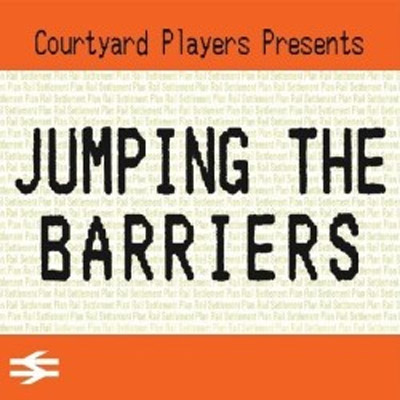Performed by The Courtyard Players
Spartan Waterloo Free United Church
7th May 2016
Reviewed by Michael Kazich
Jumping the Barriers is funny, moving and thoughtful. It was written and performed by nascent troupe The Courtyard Players, a group of actors who trained together at Brian Timothey’s Method Acting Studio in London. Even though it is a debut piece, the play is well-balanced and its humour is impeccably observed. It is easy to see why it made the billing for this year’s Edinburgh Fringe Festival.
First-time playwright Chris Daley plays Nathan, a homeless Liverpudlian on a train from Exeter to London. His initially reluctant co-traveller is middle-class tax adviser James, who is on his way to a recently-purchased flat in Camden, where his girlfriend awaits. Their first meeting is awkward but the two go on to forge a bond. The characters challenge one another’s preconceptions and those of the audience as they juxtapose class, material situations and oratorical style.
The comedy comes mainly from the radical contrast of appearance and speech between Nathan and James. Consequently, it is Nathan who provides most of the laugh-out-loud moments with his colloquial, direct and sometimes crude outbursts. James’ aura of politeness and respectability serves as the perfect foil. When he reveals the name of his fiancée: Hermione, and inadvertently paints her as severe and controlling, she becomes the butt of Nathan’s running joke. This form of extended ribbing is a typically scouse type of humour, and deliver’s many of the play’s best lines. Hermione is cruelly, and perhaps fairly, dubbed by Nathan as ‘the dominatrix’ and ‘The wicked witch of Camden’ amongst other monikers.
Although the dialogue is conducted in jarringly different accents, it is as slick as the ruse which allows Nathan to steal a can of beer from the trolley lady, in which James ends up being complicit. The body language of the two is equally good. Nathan’s facial expressions bespeak incredulity, a wry sense of knowing and childlike joy by turn, while James’ initial awkwardness is perfectly conveyed by his tensing up and fixation on his mobile phone.
Nathan’s torrid life story evokes increasing interest and sympathy from James, who in turn reveals more and more to Nathan’s streetwise analysis. It becomes clear that although James has everything on paper; a steady job, a flat and girlfriend, he feels increasingly trapped by the ennui and predictability of a middle-class life. Nathan on the other hand, is composed, confident and happy despite having nothing. James reflects on this and asks in exasperation: ‘How do you stay so optimistic?’
Both characters learn something to challenge their prejudices. James reveals that, far from having been born with a silver spoon in his mouth, he has had to work extremely hard to get to where he is. Having arrived, he isn’t at all happy in that place. For his part, Nathan reveals an unexpectedly sophisticated grasp of Ancient Egyptian history, as well as a penchant for quoting intellectual concepts and obscure academic definitions.
Nathan reveals the key to his happiness is freedom, one of the play’s main themes writ large in its climactic scene. James feels utterly unfree.
But despite the mutual learning experience, and the fact that Nathan seems the happier of two, events bring a sobre realism to the situation. There is a reminder that, for all of Nathan’s freedom and his indefatigable spirit, the bind of his material situation makes the sort of change that James could make if he so chose, almost impossible to achieve.
The performance at the preview was virtually error-free. Doubtless this was achieved through scrupulous rehearsal, but it suggested a real chemistry and familiarity between the actors. That the group had learned their trade together and were on a journey of their own was palpable. There were a couple of momentary pauses, but they were so minor it was not even clear if they were accidental. As one audience member noted – real dialogue is full of gaps and small silences.
The stage effects at the preview, held at the spartan Waterloo Free United Church, were necessarily minimal. However, the train voyage setting was convincingly maintained down to the introductory PA announcement, which asked ‘passengers’ to ‘switch off their mobile phones’ and that the ‘service’ would be ‘calling at scenes of strong language.’
This is an extremely relatable and relevant piece of theatre. Anyone who has been on public transport regularly will have experienced or witnessed a similar situation. The inherent, lubricating humour of a chance meeting warms the heart, as does the essential good nature of both characters. Yet the play also provides serious food for thought. Now that homelessness has increased so dramatically in the UK, Jumping the Barriers is an extremely timely examination of the attitudes and perceptions surrounding the issue. It balances hope and despair and will have you chuckling as it does so.
